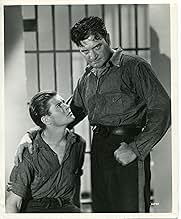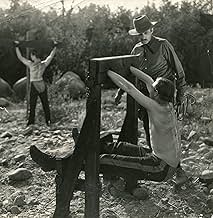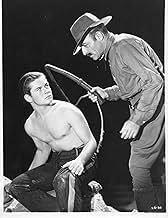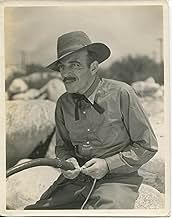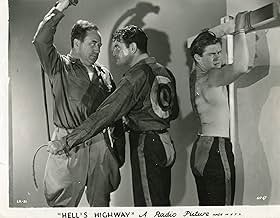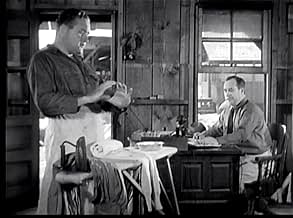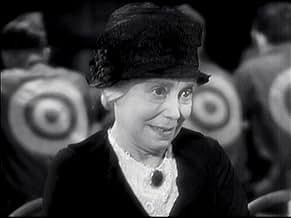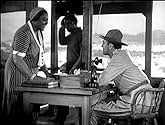Chain gang prisoners forced to construct a "liberty highway" for their overseer chasten under his brutal stewardship, causing Duke Ellis to mastermind a mass riot.Chain gang prisoners forced to construct a "liberty highway" for their overseer chasten under his brutal stewardship, causing Duke Ellis to mastermind a mass riot.Chain gang prisoners forced to construct a "liberty highway" for their overseer chasten under his brutal stewardship, causing Duke Ellis to mastermind a mass riot.
- Directors
- Writers
- Stars
- Awards
- 1 win total
- Hunt Club Manager on Telephone
- (uncredited)
- Singer in Etude Ethiopian Chorus
- (uncredited)
- Turkey Neck Burgess - the Cook
- (uncredited)
- Directors
- Writers
- All cast & crew
- Production, box office & more at IMDbPro
Featured reviews
Hell's Highway opens with newspaper stories depicting chain gang abuses - and unlike most films, it uses real newspapers such as the Seattle Post-Intelligencer. Richard Dix is "Duke" - a hardened criminal, not an innocent victim of injustice, but it's never mentioned if he's committed any crimes worse than bank robbery. Dix is better here than in some other films in which I've seen his over-emoting - such as "Cimarron" which I've found almost unwatchable.
Early scenes in the film have Charles Middleton as Matthew - Ming the Merciless - as a character who seems to predate John Carradine's "Casey" in "The Grapes of Wrath" in being a rather touched preacher. He even resembles the lanky Carradine and coincidentally, Middleton also happens to appear in 1932's most famous chain gang film. Duke involves Matthew in a plan to aid his escape, but Duke turns back when he sees his younger brother Johnny (played by Tom Brown) has just arrived in the holding pen. While Duke tries to keep his sibling on the straight and narrow, he receives the wrath of his fellow prisoners who think that he's sold out to the screws. C. Henry Gordon, so memorable in a number of Charlie Chan films, is the primary villain, although Oscar Apfel's "Billings" - a contractor relying on convict labor is really the one setting policy. Wonder if he's the one who decided to have the prisoners wear large circular targets on their shirt backs, he's sure proud of his sweat box used for discipline.
Although the story may now seem by-the-numbers, it must have been fresh in 1932 being the first film to depict the horrors of the chain gang. Although not as hard hitting as the Warner film, it's hardly as "viewer friendly" as the much later "Cool Hand Luke." RKO's film may not have broken a thousand chains as did the Warner classic, but it makes a great companion piece, and is one of the best examples of a rival studio attempting to tread on Warner territory. There are some quick cuts, which combined with the running time of only 62 minutes, that give the impression that the film may have been longer before release - Dix was too big a property for a programmer.
Catch those rolling cages the convicts are kept in. They'd even be sub-standard for wild animals in a circus. But then, this is a down and dirty look at a chain-gang work crew, circa 1932, where shooting a con is made easier by the bull's eye on their backs. And if a con misbehaves, like not working fast enough to make the road contractor more money, it's a time in the sweat box, which is like doing time in an upright coffin-- you walk in, they carry you out. Now all this might sound like a lefty screenwriter's fevered dream, but the prologue assures us that the abuses are based on fact.
Then too, the cons are toiling in the middle of one ugly nowhere, and when the place catches fire, it's big enough to take down Chicago. No wonder the cons are looking to escape, and being a prison movie, they do. In my book, the best scene is the luckless deaf guy who never hears the bullet coming. I hope his last minute mumbo-jumbo was enough to get him past the pearly gates—it's a moving and inspired moment.
Then too, Dix makes a convincing boss con, as does C. Henry Gordon as the brutal boss muleskinner. But my money's on the cadaverous Charles Middleton (the hermit) who's on prison vacation from three wives and apparently dabbles in the black arts as when he foresees doom in the stars. His graveyard voice and grim reaper demeanor are like no other and can chill you to the proverbial bone.
Of course, being a Rowland Brown directed film, there are passing references to homo-erotic behavior, (see especially his Blood Money {1933}). All in all, he manages to blend the diverse story elements, including the black men's chorus, into a forcefully memorable whole. Too bad his directing career was so brief. He was that rarest bird in old Hollywood—a genuinely independent spirit.
It's a bang-up 60-minutes from struggling little RKO that takes no prisoners, so to speak. More importantly, there's something topical about tax-supported labor being used to enrich private contractors, as in the movie. Too bad, this over-looked little gem was assigned to pre-Code oblivion.
Hard hitting & gritty, this neglected little drama is fascinating in its detailed portrayal of a tough subject. Road gang prisoners were still being systematically abused in 1932 and this film helped to shine a light into some very dirty corners, while at the same time delivering a compelling human interest story.
Richard Dix gives a typically fine performance as Duke Ellis, a bad guy with a good heart. He's able to dominate the other prisoners until his kid brother (very well played by Tom Brown) reveals his soft spot. Dix was a strong, virile actor who survived the transition from Silents to Talkies in good form and easily projected a persona of raw intensity. It is a shame that he is nearly forgotten today.
Although she receives third place billing, lovely Rochelle Hudson, as young Brown's girlfriend, has very little to do in her only scene. Of much more interest is elderly Louise Carter, as the distraught mother of Dix & Brown. In her few moments of screen time she delivers a terrific performance of a good woman barely holding on to her emotional balance. Her participation in the film alone would make it worth watching.
A handful of character actors also add to the movie's distinction: beefy Stanley Fields as a sympathetic prison officer; Charles Middleton as a mystic, other-worldly prisoner; C. Henry Gordon as the sadistic violin playing warden; Sandy Roth as a violent, nearly blind, prisoner; and Warner Richmond as a guard who fears he may also be a cuckold.
Clarence Muse & Fuzzy Knight have small roles as prisoners. Movie mavens will spot an uncredited Louise Beavers as Muse's visiting sweetheart.
An intriguing aspect of the film is how the black prisoners are used as a kind of Greek Chorus, their songs making ironic comment upon the action. Their 'Frankie and Johnny' parody sequence in particular is a quietly brilliant moment of film-making in how it encapsulates, in a very short time, a key plot twist.
Did you know
- TriviaRKO executives were concerned about a possible plagiarism suit by the author of the book and the movie version I Am a Fugitive from a Chain Gang (1932) in production at Warner Bros. at the time. Some deletions and changes were made until they were satisfied that no legal action would be taken.
- Quotes
Duke Ellis: [Chatting with a convicted bigamist] How many women did you really marry?
Matthew the Hermit: How many banks did you really rob?
Duke Ellis: Never more than one at the same time.
Matthew the Hermit: It takes nerves of steel to rob a bank.
Duke Ellis: It takes a lot of backbone to keep three wives happy.
Matthew the Hermit: Yea, Brother!
- How long is Hell's Highway?Powered by Alexa
Details
- Release date
- Country of origin
- Languages
- Also known as
- Chain Gang
- Filming locations
- Production company
- See more company credits at IMDbPro
- Runtime
- 1h 2m(62 min)
- Color
- Aspect ratio
- 1.37 : 1

